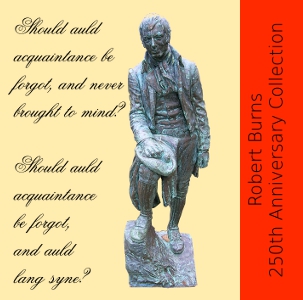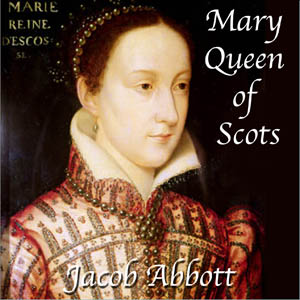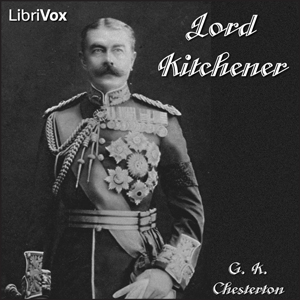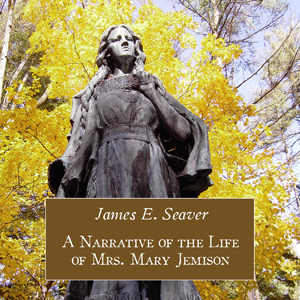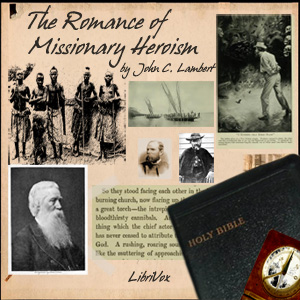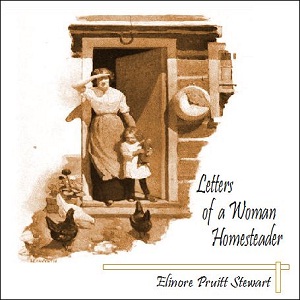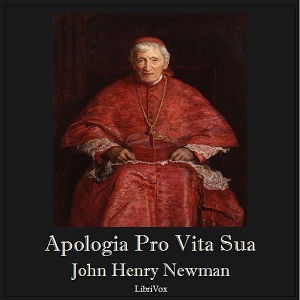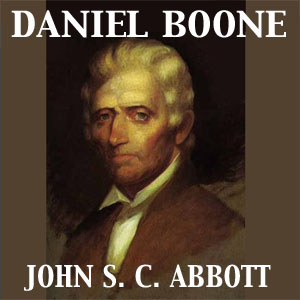Robert Burns, the national bard (poet) of Scotland was born on the 25th January, 1759. Scotland and all Burns fans the world over, including Librivox, were celebrating the 250th anniversary of Burns' birthday throughout 2009 and it seemed only proper to record a collection of his poems and songs. This collection also includes works from other poets and writers who have written about Burns. (Summary by Joseph Finkberg)
18 episodes
There are certain names which are familiar, as names, to all mankind; and every person who seeks for any degree of mental cultivation, feels desirous of informing himself of the leading outlines of their history, that he may know, in brief, what it was in their characters or their doings which has given them so widely-extended a fame. Consequently, great historical names alone are selected; and it has been the writer's aim to present the prominent and leading traits in their characters, and all the important events in their lives, in a bold and free manner, and yet in the plain and simple language which is so obviously required in works which aim at permanent and practical usefulness. This volume is dedicated to Mary Queen of Scots. (Summary from the preface of the book)
12 episodes
Boswell's famous work on the life of his admired friend Johnson, the formidable poet, essayist, moralist, literary critic, biographer, editor and lexicographer, is a milestone in the development of biographical writing, a treasure-house of Johnson's witticisms and opinions, and a window on his social circle that is packed with incidental detail of 18th-century life and concerns.This second of four volumes covers the years 1764-1776. (Summary by Philippa)
22 episodes

Apollonius of Tyana (ca. 40-120 AD) was a Greek Pythagorean philosopher and teacher. He hailed from the town of Tyana in the Roman province of Cappadocia in Asia Minor. His date of birth is a matter of conjecture as some say he was roughly a contemporary of Jesus.
After Apollonius' death his name remained famous among philosophers and occultists. In a "novelistic invention" inserted in the Historia Augusta, Aurelian, at the siege of Tyana in 272, was said to have experienced a visionary dream in which Aurelian claimed to have seen Apollonius speak to him, beseeching him to spare the city of his birth. In part, Aurelian said that Apollonius told him "Aurelian, if you desire to rule, abstain from the blood of the innocent! Aurelian, if you will conquer, be merciful!"
By far the most detailed source is the Life of Apollonius of Tyana, a lengthy, novelistic biography written by the sophist Philostratus at the request of empress Julia Domna. Philostratus’ account shaped the image of Apollonius for posterity and still dominates discussions about him in our times. To some extent it is a valuable source because it contains data from older writings which were available to Philostratus but disappeared later on. Many think that it is full of obviously fictitious stories and dialogues. Modern Christian scholars challenge its credibility in many regards. They dismiss most of it as pure invention.
One of the essential sources Philostratus claimed to know are the memoirs or diary of Damis, an alleged disciple and companion of Apollonius. Some scholars believe the notebooks of Damis are an invention of Philostratus. In any case it is a literary fake. Philostratus describes Apollonius as a wandering teacher of philosophy and miracle worker who was active in Italy, Spain and Ethiopia and even travelled to Mesopotamia, Arabia and India. In particular, he tells lengthy stories of Apollonius entering the city of Rome in disregard of emperor Nero’s ban on philosophers, and later on being summoned, as a defendant to the court of emperor Domitian where he defied the emperor in blunt terms.
Apollonius may have never left the Greek East. Many contend that he never came to Western Europe and was virtually unknown there till the third century AD when empress Julia Domna, who was herself an Easterner, decided to popularize him and his teachings in Rome. For that purpose she commissioned Philostratus to write the biography, where Apollonius is exalted as a fearless sage with supernatural powers, even greater than Pythagoras. Philostratus implies that upon his death, Apollonius of Tyana underwent heavenly assumption. Subsequently Apollonius was worshipped by Julia’s son emperor Caracalla and possibly also by her grand-nephew emperor Severus Alexander.
Two biographical sources earlier than Philostratus are lost: a book by emperor Hadrian’s secretary Maximus of Aegae describing Apollonius’ activities in the city of Aegae in Cilicia, and a biography by a certain Moiragenes. (Summary adapted from Wikipedia by Karen Merline)
43 episodes
There are certain names which are familiar, as names, to all mankind; and every person who seeks for any degree of mental cultivation, feels desirous of informing himself of the leading outlines of their history, that he may know, in brief, what it was in their characters or their doings which has given them so widely-extended a fame. Consequently, great historical names alone are selected; and it has been the writer's aim to present the prominent and leading traits in their characters, and all the important events in their lives, in a bold and free manner, and yet in the plain and simple language which is so obviously required in works which aim at permanent and practical usefulness. This volume is dedicated to Charles I. (Summary from the preface of the book)
11 episodes
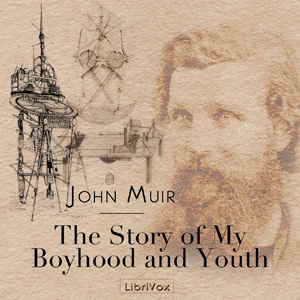
"The only fire for the whole house was the kitchen stove, with a fire box about eighteen inches long and eight inches wide and deep,- scant space for three or four small sticks, around which in hard zero weather all the family of ten shivered, and beneath which in the morning we found our socks and coarse, soggy boots frozen solid." Thus, with perceptive eye for detail, the American naturalist, John Muir, describes life on a pioneer Wisconsin farm in the 1850's. Muir was only eleven years old when his father uprooted the family from a relatively comfortable life in Dunbar, Scotland, to settle in the backwoods of North America.The elder Muir was a religious fundamentalist. What his father taught, John Muir writes, was "grim self denial, in season and out of season, to mortify the flesh, keep our bodies in subjection to Bible laws, and mercilessly punish ourselves for every fault, imagined or committed." Muir's father believed that the Bible was "the only book human beings could possibly require," while John secretly read every volume of poetry and literature he could get his hands on. With no formal schooling after leaving Scotland, John also learned from nature--keenly observing details of the seasons, the life of the farm oxen, and wild animals and birds. John also became an amateur inventor, eking out time from farm chores by getting up at 1 a.m. to whittle intricate wooden clocks by candlelight in the unheated farm house basement.Muir finally made a break for freedom--his decision was to go to Madison, Wisconsin, and enter his clocks in the State Fair, with the hope that somebody might see them and offer him a job in a machine shop! All the baggage he carried the day he left home was a package made up of "two clocks and a small thermometer made of a piece of old washboard, all three tied together with no covering or case of any sort, the whole looking like one very complicated machine." His father's goodbye was to admonish John about the "wicked world" and to warn him sternly that if he should find himself in need of money, none would be forthcoming. John would have to depend on himself.How John Muir made his way from that Wisconsin farm to become the great American naturalist, spokesman for Yosemite and the California redwoods, is the stuff of legend: which makes Muir's autobiographical account of his early boyhood a fascinating read. (Summary by Sue Anderson)
8 episodes
The World I Live In by Helen Keller is a collection of essays that poignantly tells of her impressions of the world, through her sense of touch, smell, her imagination and dreams.My hand is to me what your hearing and sight together are to you. In large measure we travel the same highways, read the same books, speak the same language, yet our experiences are different. All my comings and goings turn on the hand as on a pivot. It is the hand that binds me to the world of men and women. The hand is my feeler with which I reach through isolation and darkness and seize every pleasure, every activity that my fingers encounter. With the dropping of a little word from another's hand into mine, a slight flutter of the fingers, began the intelligence, the joy, the fullness of my life. Helen Keller, quoted from her essay, The Seeing Hand (Summary from text and Laura Caldwell)
17 episodes
The Agricola (Latin: De vita et moribus Iulii Agricolae, lit. On the life and character of Julius Agricola) is a book by the Roman historian Tacitus, written c 98, which recounts the life of his father-in-law Gnaeus Julius Agricola, an eminent Roman general. It also covers, briefly, the geography and ethnography of ancient Britain. As in the Germania, Tacitus favorably contrasts the liberty of the native Britons to the corruption and tyranny of the Empire; the book also contains eloquent and vicious polemics against the rapacity and greed of Rome. This translation by Alfred John Church and William Jackson Brodribb, was first published in 1877. (Summary from Wikipedia.)
4 episodes
Anthony Trollope's autobiography will delight you whether or not you've read (or listened to) any of his many works. His honest if self-deprecating tone is at times hilarious and at times piteously moving. His detailed descriptions of his writing process and his philosophy of writing as work rather than art are fascinating. Fans of Trollope will enjoy learning the man's perceptions of his novels' shortcomings and triumphs. Anyone will appreciate learning about his years devoted to churning out literature for profit while working full time with the post office. (Summary by JessicaLouise)
21 episodes
"This book contains the record of a few of the many happy days and novel experiences which I have had in the wilds. For more than twenty years it has been my good fortune to live most of the time with nature, on the mountains of the West. I have made scores of long exploring rambles over the mountains in every season of the year, a nature-lover charmed with the birds and the trees. On my later excursions I have gone alone and without firearms. During three succeeding winters, in which I was a Government Experiment Officer and called the "State Snow Observer," I scaled many of the higher peaks of the Rockies and made many studies on the upper slopes of these mountains." (Summary from the Preface of Wild Life on the Rockies)
15 episodes
“The paradox of all this part of his life lies in this--that, destined as he was to be the greatest enemy of Mahomedanism, he was quite exceptionally a friend of Mahomedans.” (Summary quoted from Gilbert Keith Chesterton)
4 episodes

Marie Francoise Therese Martin, affectionately known as 'The Little Flower', was born on January 2, 1873, in Alencon, France to Louis Martin and Zelie Guerin. She was the youngest and one of five surviving sisters of the nine Martin children. When Therese was 3, her mother died. Louis Martin moved his family to Lisieux to be closer to his late wife's brother and his family. It was there that Therese's sister, Pauline, entered the Carmel at Lisieux on October 2, 1882. Therese at that time also heard the Divine Call to religious life. Therese entered the Carmel on April 9, 1888, after much oppostion to her entering at the age of 15. It was there that she wrote L'Histoire d'une Ame (The Story of a Soul) through obedience. Eventually, Therese's other sisters entered the religious life, one at the Carmel of Lisieux and the other became a Poor Clare at the Visitation Convent at Caen. Therese died on September 30, 1897, at the Carmel of Lisieux of tuberculosis. She was beatified on April 29, 1923 and canonized on May 17, 1925. (Summary written by Ann Boulais.)
13 episodes
A biography of the Polish composer and virtuoso pianist Frédéric Chopin and a critical analysis of his work by American music writer and critic James Huneker. (Summary by Julie VW)
16 episodes

The Autobiography of Charles Darwin is the autobiography of the British naturalist Charles Darwin which was published in 1887, five years after his death.Darwin wrote the book, which he entitled Recollections of the Development of my Mind and Character, for his family. He states that he started writing it on about May 28, 1876 and had finished it by August 3.The book was edited by Charles Darwin's son Francis Darwin, who removed several passages about Darwin's critical views of God and Christianity (see Charles Darwin's views on religion). It was published in London by John Murray as part of The life and letters of Charles Darwin, including an autobiographical chapter.The omitted passages were later restored by Darwin's granddaughter Nora Barlow in a 1958 edition to commemorate the 100th anniversary of the publication of The Origin. This edition was published in London by Collins under the title of The Autobiography of Charles Darwin 1809-1882. With the original omissions restored. Edited and with appendix and notes by his granddaughter Nora Barlow.The original is in the public domain as its copyright has expired, but the later version remains under copyright.(Summary by Wikipedia)
6 episodes
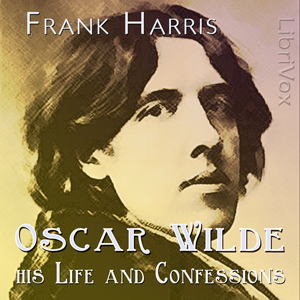
Consumers of biography are familiar with the division between memoirs of the living or recently dead written by those who "knew" the subject more or less intimately, and the more objective or scholarly accounts produced by later generations.
In the case of Wilde, as presented to us by Frank Harris, we are in a way doubly estranged from the subject. We meet with Oscar the charismatic talker, whose tone of voice can never be reproduced – even if a more scrupulous biographer had set down his words accurately – and we are perhaps already aware of him as Wilde the self-destructive celebrity who uneasily fills the place of the premier gay icon and martyr in our contemporary view.
Neither of these images will do. We need to read as many accounts as possible. Harris, though himself a self-advertising literary and sexual buccaneer, takes a wincingly representative view of Wilde’s homophile activity: for him it is a patrician excrescence, the abominable vice of the few, contracted at English boarding schools – though thankfully “not infectious” as far as he himself is concerned.
What a long road we have to travel to arrive at the essentially gay man of today! But there are many shortcuts to take us back to where we came from… (Summary by Martin Geeson)
29 episodes
By his own admission, Thomas Frost found it hard to make a living from his writing, and no doubt he used the name of Dickens in the title of this book to boost sales. Frost tells a good tale, and the book is not only of interest to enthusiasts of Dickens and the county of Kent.He includes some of Dickens' own descriptions of locations, as well as regaling us with anecdotes about towns and villages which he visits, including an account of the last armed rising on British soil - the Battle of Bossenden Wood.As well as accounts of his travels through the highways and byways of Kent in the footsteps of Dickens and his characters, he also wanders into the lanes of myth and legend, sometimes making up his own stories along the way.After managing to forgive his cardinal sin of confusing Men of Kent and Kentish Men in the first chapter, I found this rather odd mixture of memoir, short stories and literary travelogue a most enjoyable read. (Summary by Ruth Golding)
14 episodes

Dumas's 'Celebrated Crimes' was not written for children. The novelist has spared no language--has minced no words--to describe the violent scenes of a violent time.In some instances facts appear distorted out of their true perspective, and in others the author makes unwarranted charges. The careful, mature reader, for whom the books are intended, will recognize, and allow for, this fact. (from publisher's note)The first volume comprises the annals of the Borgias and the Cenci. The name of the noted and notorious Florentine family has become a synonym for intrigue and violence, and yet the Borgias have not been without stanch defenders in history.Another famous Italian story is that of the Cenci. The beautiful Beatrice Cenci--celebrated in the painting of Guido, the sixteenth century romance of Guerrazi, and the poetic tragedy of Shelley, not to
mention numerous succeeding works inspired by her hapless fate—will always remain a shadowy figure and one of infinite pathos. (from Introduction)
34 episodes
The Apology is Plato's version of the speech delivered by Socrates before the Athenian people in his defence agaist charges of impiety and of misleading others, which ended in his condemnation and death in 399 BC. It is the earliest and most eloquent expression of what has been termed 'philosophical faith', as that love and search for truth which gives meaning to life and trust in the face of death. (Summary by zaaf)
Ο Πλάτωνας ήταν σπουδαίος Έλληνας φιλόσοφος και συγγραφέας (427 π.Χ. - 347 π.Χ.), ο γνωστότερος μαθητής του Σωκράτη. Ο Πλάτων έγραψε την Απολογία του Σωκράτους, που θεωρείται ως μια σχετικά ακριβής καταγραφή της απολογίας του Σωκράτη στη δίκη που τον καταδίκασε σε θάνατο. (Summary by Wikipedia)
6 episodes
Mrs. Mary Jemison was taken by the Indians, in the year 1755, when only about twelve years of age, and has continued to reside amongst them to the present time. Containing an account of the murder of her father and his family; her sufferings; her marriage to two Indians; her troubles with her children; barbarities of the Indians in the French and Revolutionary Wars; the life of her last husband, and many historical facts never before published. (Summary by James Seaver)
20 episodes
The title page gives this book the subtitle, “True stories of the intrepid bravery and stirring adventures of missionaries with uncivilized man, wild beasts, and the forces of nature in all parts of the world.” The thrilling accounts in this collection include stories of Jacob Chamberlain’s medical ministry in India, the dangers faced by Alexander Mackay in Uganda, James Chalmers’ work among the headhunters of New Guinea, John Paton’s mission to the South Sea cannibals, and the Hawaiian queen Kapiolani’s challenge to the gods of the volcano. “Romantic” in the sense that these brave missionaries faced the unknown, but never “romanticized” – all sacrificed home and luxury, and many suffered the loss of family, fortune, and even their lives. (Summary by D. Leeson)
24 episodes
Christopher Carson, or as he was familiarly called, Kit Carson, was a man whose real worth was understood only by those with whom he was associated or who closely studied his character. He was more than hunter, trapper, guide, Indian agent and Colonel in the United States Army....His lot was cast on the extreme western frontier, where, when but a youth, he earned the respect of the tough and frequently lawless men with whom he came in contact. Integrity, bravery, loyalty to friends, marvelous quickness in making right decisions, in crisis of danger, consummate knowledge of woodcraft, a leadership as skilful as it was daring; all these were distinguishing traits in the composition of Carson and were the foundations of the broader fame which he acquired as the friend and invaluable counselor of Fremont, the Pathfinder, in his expeditions across the Rocky Mountains. (Summary from the Introduction)
39 episodes

Rosa Luxemburg war eine bedeutende Vertreterin der europäischen Arbeiterbewegung und des proletarischen Internationalismus. Sie gehörte zu den Gründungsmitgliedern der KPD, deren Programm sie hauptsächlich verfasste.Während des ersten Weltkriegs verbrachte Rosa Luxemburg drei Jahre und vier Monate im Gefängnis, ein Jahr im Berliner Weibergefängnis (Barnimstraße), dann zwei Jahre und vier Monate in Berlin, Wronke und Breslau. Während dieser Zeit schrieb sie viele persönliche Briefe an Sophie Liebknecht, die einen tiefen Einblick in die starke Persönlichkeit dieser ungewöhnlichen Frau geben. Die Leser lernen "den Reichtum ihres unermüdlich quellenden Herzens kennen. Sie sollen sehen, wie diese Frau, über ihren eigenen Leiden stehend, alle Wesen der Schöpfung mit verstehender Liebe und dichterischer Kraft umfängt, wie ihr Herz in Vogelrufen erzittert, wie Verse beschwingter Sprache in ihr widerklingen, wie Schicksal und tägliches Tun der Freunde in ihr geborgen sind." (Aus der Einleitung)Am 15. Januar 1919, nur zwei Monate nach ihrer Freilassung wurde sie unter teils ungeklärten Umständen zusammen mit Karl Liebknecht von rechtsradikalen Freikorps-Soldaten ermordet.(Summary by Wikipedia and Hokuspokus)
5 episodes
An account given of the lives of five great naturalists (Hippocrates, Aristotle, Galen, Vesalius and Harvey) will not be found devoid of interest. The work of each one of them marked a definite advance in the science of Biology.
There is often among students of anatomy and physiology a tendency to imagine that the facts with which they are now being made familiar have all been established by recent observation and experiment. But even the slight knowledge of the history of Biology, which may be obtained from a perusal of this little book, will show that, so far from such being the case, this branch of science is of venerable antiquity. And, further, if in the place of this misconception a desire is aroused in the reader for a fuller acquaintance with the writings of the early anatomists the chief aim of the author will have been fulfilled. (Summary is the Preface to the book, adapted by Neeru Iyer)
5 episodes
Saint Teresa of Ávila, also called Saint Teresa of Jesus, baptized as Teresa Sánchez de Cepeda y Ahumada, (March 28, 1515, at Gotarrendura (Ávila), Old Castile, Spain – October 4, 1582, at Alba de Tormes, Salamanca, Spain) was a prominent Spanish mystic, Carmelite nun, and writer of the Counter Reformation. She was a reformer of the Carmelite Order and is considered to be, along with John of the Cross, a founder of the Discalced Carmelites. In 1970 she was named a Doctor of the Church by Pope Paul VI. (Summary from wikipedia.org)
40 episodes

Cellini's autobiographical memoirs, which he began writing in Florence in 1558, give a detailed account of his singular career, as well as his loves, hatreds, passions, and delights, written in an energetic, direct, and racy style. They show a great self-regard and self-assertion, sometimes running into extravagances which are impossible to credit. He even writes in a complacent way of how he contemplated his murders before carrying them out. He writes of his time in Paris:
Parts of his tale recount some extraordinary events and phenomena; such as his stories of conjuring up a legion of devils in the Colosseum, after one of his not innumerous mistresses had been spirited away from him by her mother; of the marvelous halo of light which he found surrounding his head at dawn and twilight after his Roman imprisonment, and his supernatural visions and angelic protection during that adversity; and of his being poisoned on two separate occasions.
The autobiography is a classic, and commonly regarded as one of the most colourful; it is certainly the most important autobiography from the Renaissance.
Cellini's autobiography is one of the books Tom Sawyer mentions as inspiration while freeing Jim in The Adventures of Huckleberry Finn. (Summary adapted from Wikipedia by Karen Merline)
22 episodes
The writer of the following letters is a young woman who lost her husband in a railroad accident and went to Denver to seek support for herself and her two-year-old daughter, Jerrine. Turning her hand to the nearest work, she went out by the day as house-cleaner and laundress. Later, seeking to better herself, she accepted employment as a housekeeper for a well-to-do Scotch cattle-man, Mr. Stewart, who had taken up a quarter-section in Wyoming. The letters, written through several years to a former employer in Denver, tell the story of her new life in the new country. They are genuine letters, and are printed as written, except for occasional omissions and the alteration of some of the names. (Publishers’ Note, May 1914)
26 episodes
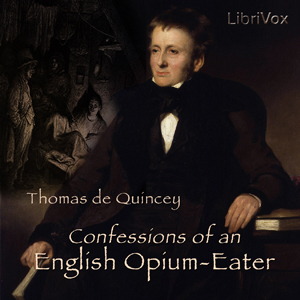
“Thou hast the keys of Paradise, O just, subtle, and mighty Opium!”Though apparently presenting the reader with a collage of poignant memories, temporal digressions and random anecdotes, the Confessions is a work of immense sophistication and certainly one of the most impressive and influential of all autobiographies. The work is of great appeal to the contemporary reader, displaying a nervous (postmodern?) self-awareness, a spiralling obsession with the enigmas of its own composition and significance. De Quincey may be said to scrutinise his life, somewhat feverishly, in an effort to fix his own identity.The title seems to promise a graphic exposure of horrors; these passages do not make up a large part of the whole. The circumstances of its hasty composition sets up the work as a lucrative piece of sensational journalism, albeit published in a more intellectually respectable organ – the London Magazine – than are today’s tawdry exercises in tabloid self-exposure. What makes the book technically remarkable is its use of a majestic neoclassical style applied to a very romantic species of confessional writing - self-reflexive but always reaching out to the Reader. (Summary by Martin Geeson)
16 episodes
A General History of the Robberies and Murders of the most notorious Pyrates is a 1724 book containing biographies of contemporary pirates. It's author uses the name Captain Charles Johnson, generally considered a pseudonym.
The real identity of the author was thought by some scholars to be Daniel Defoe, although this has since been disputed. The publisher Nathaniel Mist or somebody working for him are other suggested authors.
In the first volume, "Johnson" sticks fairly close to the available sources, though he embellishes the stories somewhat. Nevertheless, the book was influential in shaping popular notions of piracy and provided the standard account of the lives of many individuals still famous in the 21st century.(Summary by Wikipedia)
42 episodes
There are certain names which are familiar, as names, to all mankind; and every person who seeks for any degree of mental cultivation, feels desirous of informing himself of the leading outlines of their history, that he may know, in brief, what it was in their characters or their doings which has given them so widely-extended a fame. Consequently, great historical names alone are selected; and it has been the writer's aim to present the prominent and leading traits in their characters, and all the important events in their lives, in a bold and free manner, and yet in the plain and simple language which is so obviously required in works which aim at permanent and practical usefulness. This volume is dedicated to Hannibal. (Summary from the preface of the book)
13 episodes
An autobiography of Helen Keller published when the author was still in her early 20's. The narrative reveals how her mind developed and matured until she began her studies at Radcliffe College (Summary by George Cooney)
23 episodes
Rose Wilder Lane was a newspaper reporter, free-lance writer, political activist, and the daughter of Laura Ingalls Wilder, author of the "Little House" series of popular children's books. In this biography of Henry Ford, Ms. Lane worked directly with Ford to tell his story from his birth to his founding of the Ford Motor Company and his use of modern assembly lines to mass produce his cars. (Summary by Lee Ann Howlett.)
31 episodes
Ellen Gould White (1827 - 1915) was a prolific Christian writer, authoring 40 books in her lifetime. She was active in the Millerite movement, and was one of the principle founders of the Seventh Day Adventist Church. The Desire of Ages, first published in 1898, tells the story of the life of Jesus Christ in loving detail. It is the third book in her five volume "Conflict of the Ages" series. (Summary by Donald Hines)
87 episodes
"I have to thank all the previous students of Shelley as poet and man--not last nor least among whom is my husband--for their loving and truthful research on all the subjects surrounding the life of Mrs.Shelley." -Lucy Madox Brown Rossetti
Mrs. Shelley is a biography of Mary Wollstonecraft Godwin Shelley, author of Frankenstein and other works, wife of Percy Shelley, daughter of Mary Wollstonecraft Godwin who penned The Vindication of the Rights of Women, and daughter of William Godwin, a philosopher and novelist. The life of this woman, who at nineteen wrote a story that has become a part of everyday culture, is its own story to tell. The author Lucy Madox Brown Rossetti was the daughter of the artist Ford Madox Brown and the wife of William Michael Rossetti of the Pre-Raphaelite Brotherhood. (Summary by A.L. Gramour)
29 episodes
The Education of Henry Adams records the struggle of Bostonian Henry Adams (1838-1918), in early old age, to come to terms with the dawning 20th century, so different from the world of his youth. It is also a sharp critique of 19th century educational theory and practice. In 1907, Adams began privately circulating copies of a limited edition printed at his own expense. Commercial publication had to await its author's 1918 death, whereupon it won the 1919 Pulitzer Prize. (Introduction by Wikipedia)
36 episodes
Sir Walter Raleigh's plan in 1584 for colonization in the "Colony and Dominion of Virginia" (which included the present-day states of North Carolina and Virginia) in North America ended in failure at Roanoke Island, but paved the way for subsequent colonies. The state capital of North Carolina was named in 1792 for Sir Walter Raleigh, sponsor of the Colony of Roanoke. Gosse’s biography was the first attempt to portray his personal career apart from the general history of his time. At the time of original publication Edmund Gosse was Clark Lecturer in English Literature at Trinity College, Cambridge. (Introduction by Wikipedia and Eugene Smith.)
13 episodes
Warner's thoughtful and often humorous memoir of his life as a young farm-boy in Charlemont, Massachusetts. (Introduction by Mark Penfold)
19 episodes
The Lives of the Queens of England is a multi-volumed work attributed to Agnes Strickland, though it was mostly researched and written by her sister Elisabeth. These volumes give biographies of the queens of England from the Norman Conquest in 1066. Although by today's standards, it is not seen as a very scholarly work, the Stricklands used many sources that had not been used before.Volume one includes the biographies of Matilda of Flanders, Matilda of Scotland, Adelicia of Louvaine, Matilda of Boulogne and Eleanora of Aquitaine.(Introduction by Ann Boulais)
18 episodes

By Zorra, in the following sketches, is meant a little district in Oxford county, Ontario, some ten miles square, composed of part of East and part of West Zorra, and containing a population of about fourteen hundred. It was settled about the year 1830, chiefly by Highlanders from Sutherlandshire, Scotland.
Within the last forty years there have gone from this district over one hundred young men who have made their mark in the world. With most of these it has been the writer's good fortune to be personally and intimately acquainted; and companionship with some of them has been to him a pleasure and a benefit.
It is not intended to include all these in the following sketches; this were impracticable, but it is believed that a brief, unvarnished account of the career of some of them may be an inspiration, not only to the young men of Zorra to-day, but to men everywhere struggling against difficulties, and earnestly engaged in the conflict of life. Such sketches will also be to many a pleasant souvenir of early days, when
"Hearts were light as ony feather,
Free frae sorrow, care and strife." (summary by W.A. MacKay (1900))
25 episodes
A look at some of the famous women in European history. Includes biographies on Cleopatra; Isabella of Castile; Joan of Arc; Maria Theresa; Josephine; Elizabeth of England; Mary of Scotland; Catherine of Russia; Marie Antoinette; and Madame Roland.
Mr. Jenkins, whose name remains on the title-page of this volume, was prevented from finishing the work for a long time by sickness, and finally by death. The first chapter is from his pen, and the rest has been written according to his instructions by one whom he selected, and who has had access to works rare in this country, such as Monstrelet's Chronicles, Tooke's Life of Catherine II., Madame Roland's Appeal, etc. (Summary by TriciaG & Publisher's Preface)
41 episodes
Many books describe the role of men during American history. However, at the same time, women did much: comforted, fought, helped, raised children, and much more. This book is full of mini-biographies of women in many places, and many ages- each chapter telling about a different subject. (Summary by Stav Nisser)
22 episodes
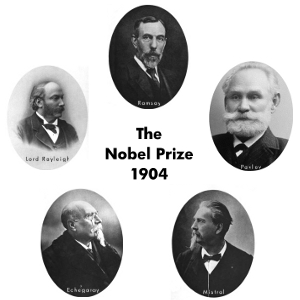
The Nobel Prizes are international awards bestowed once a year by Scandinavian committees for cultural and scientific advances. They were established in 1895 by the Swedish chemist Alfred Nobel, the inventor of dynamite. The prizes in Physics, Chemistry, Physiology or Medicine, Literature, and Peace were first awarded in 1901.
The Laureats of 1904 were:
in Physics: Lord Rayleigh (John William Strutt, 1842 - 1919), "for his investigations of the densities of the most important gases and for his discovery of argon in connection with these studies";
in Chemistry: Sir William Ramsay (1852 - 1916), "for his discovery of the inert gaseous elements in air, and his determination of their place in the periodic system";
in Physiology or Medicine: Ivan Petrovich Pawlow (1849 - 1936), "in recognition of his work on the physiology of digestion, through which knowledge on vital aspects of the subject has been transformed and enlarged";
in Literature: Frédéric Mistral (one half, 1830 - 1914), "in recognition of the fresh originality and true inspiration of his poetic production, which faithfully reflects the natural scenery and native spirit of his people, and, in addition, his significant work as a Provençal philologist",
and José Echegaray y Eizaguirre (one half, 1832 - 1916), "in recognition of the numerous and brilliant compositions which, in an individual and original manner, have revived the great traditions of the Spanish drama";
in Peace: Institut de droit international (Institute of International Law), "for its efforts as an unofficial body to formulate the general principles of the science of international law.".
This multilingual collection contains the presentation speeches for the Laureats, their biographies, as well as the famous "Nobel lectures" for the three scientific awards. The presentation speeches, originally given in Swedish, were translated by the Nobel Foundation into the mother tongue of the Laureats. (Summary by Availle and Wikipedia)
15 episodes
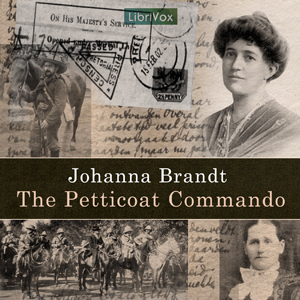
In introducing the English version of this book I venture to bespeak a welcome for it, not only for the light which it throws on some little-known incidents of the South African war, but also because of the keen personal interest of the events recorded. It is more than a history. It is a dramatic picture of the hopes and fears, the devotion and bitterness with which some patriotic women in Pretoria watched and, as far as they could, took part in the war which was slowly drawing to its conclusion on the veld outside.
I do not associate myself with the opinions expressed by the writer as to the causes of the war or the methods adopted to bring it to an end, or as to the policy which led to the Concentration Camps, and the causes of the terrible mortality which prevailed during the first months of their existence. On these matters many readers will hold different opinions from the writer, or will prefer to let judgment be in suspense and to look to the historian of the future for a final verdict. We are still too near the events to be impartial. But this book does not challenge or invite controversy. Fortunately for South Africa, most of us on both sides can now discuss the events of the war without bitterness and understand and respect the feelings of those who were most sharply divided by these events from ourselves.
The greater part of the narrative comes from a diary kept during the war with unusual fullness and vividness. The difficulty experienced by the writer of the diary in communicating to friends outside Pretoria information about what was passing inside, and in unburdening herself of the feelings roused in her by the events of the war, made the diary more than usually intimate. To understand fully many of the narratives which have been transferred from it to this book, it must be remembered that one is reading, not something written from memory years after the event, but rather the record of a conversation at the time, in which the diarist is describing the events as if to a friend who shares to the full all her own feelings and to whom she can speak without reserve.
Much has happened in the ten years which have passed since the end of the war. The country which was distracted by the conflicting ideals and interests of its different Governments and peoples has become the Union of South Africa. It is now one State. It remains that it should call forth a spirit of patriotism and nationality which will unite and not divide its people.(Introduction by Patrick Duncan)
42 episodes
Clara Barton, founder of the American Red Cross, recalls growing up in early 19th Century Massachusetts. (Introduction by Veronica Jenkins)
6 episodes
A religious autobiography of unsurpassed interest, the simple confidential tone of which "revolutionized the popular estimate of its author," establishing the strength and sincerity of the convictions which had led him into the Roman Catholic Church(Wikipedia)."No autobiography in the English language has been more read; to the nineteenth century it bears a relation not less characteristic than Boswell's 'Johnson' to the eighteenth." Rev. Wm. Barry, D.D.
25 episodes

“Who can help laughing when an ordinary journalist seriously proposes to limit the subject-matter at the disposal of the artist?”“We are dominated by journalism.... Journalism governs for ever and ever.”[/i]One of the nastiest of the British tabloids was founded a year too late to join in the moral panic generated to accompany Oscar Wilde’s court appearances in 1895. Yet there was no shortage of hypocritical journalists posing as moral arbiters to the nation, then as now.This compendium work - skilfully assembled by the editor, Stuart Mason - ends with transcript of Wilde’s first appearance in the Old Bailey, when he was cross-examined on the alleged immorality of his novel The Picture of Dorian Gray. The disastrous outcome of these trials provides an ironic conclusion to the earlier knockabout exchanges between Oscar and his reviewers. In these he is at his flamboyant best, revelling in the publicity he pretends to disdain. His brave performances in the dock did nothing, however, to save him from hard labour, the treadmill and complete physical and moral breakdown which the law found it necessary to inflict on him.In contrast to the hacks and lawyers, two refreshingly open-minded Americans write perceptively about the novel, as does Walter Pater, the grand old man of Aestheticism.This solo Librivox project complements a new dramatised reading of The Picture of Dorian Gray, currently in preparation, featuring the present reader as Narrator. (Introduction by Martin Geeson)
18 episodes
Published posthumously in 1919, this collection of diary entries presents a scathing picture of army life and is said to be one of the most vivid accounts of daily life in the trenches. It chronicles West's increasing disillusion with war and his move toward pacifist and atheist beliefs. The final part consists of his powerful war poems, including God, How I Hate You, You Young Cheerful Men, and Night Patrol. West was killed by a sniper in 1917. In view of some of his poems, one wonders if death was not unwelcome. (Introduction adapted from Wikipedia by Ruth Golding)
6 episodes
This is a detailed biography of the life and adventures of Daniel Boone. His accomplishments are brushed over in history classes these days and not given the recognition they deserve. This biography clearly paints a picture of the benevolent person of Daniel Boone as well as the achievements he made in furthering European settlement in America. (Summary by Allyson Hester)
14 episodes

Die Jugenderinnerungen Karl Leberecht Immermanns sind ursprünglich in den drei Bänden »Memorabilien« eingeschlossen, die so vielerlei enthalten, daß sie im Ganzen nur wenigen Lesern mundgerecht sein können. Sodann hat Immermann durch seine Bescheidenheit und seine Betrachtungslust sich verleiten lassen, die Erzählung der eigenen und der vaterländischen Erlebnisse immer wieder durch lange geschichtsphilosophische, politische, literarische und andere Erörterungen zu unterbrechen und Vergleiche zwischen 1840 und 1810 zu ziehen, die uns Nachkömmlinge nicht mehr fesseln können. Es sind Leitartikel vorzüglichster Art, aber wer mag jetzt noch Leitartikel von Anno 1840 lesen? Auch vermeidet Immermann manche Anspielung nicht, die heute auch dem Gelehrten schwerverständlich geworden ist, gebraucht auch manches Fremdwort, das jetzt bereits veraltet ist. Am raschesten mußte der Titel veralten, denn Immermann nannte diesen Teil seiner Memorabilien: »Die Jugend vor fünfundzwanzig Jahren«.
Da nun aber der Kern des Werkes recht wertvoll ist, so haben wir den Versuch gemacht, durch ein unbarmherziges Streichen alles die Erzählung Hemmenden, durch andere Einteilung, durch Umsetzung einiger Seiten, durch Erklärung der Anspielungen und gelehrten Worte aus dem Alten ein Neues zu machen, das wir nun für recht lesbar und anschaulich halten. Ein Kapitel gar, unser zwölftes, haben wir einer andern Schrift des Dichters entnommen, nämlich seinem Bericht »Das Fest der Freiwilligen zu Köln am Rheine den 3. Februar 1830«. Wir halten aus einem besonderen Grunde diese Bearbeitung und Ausnutzung für erlaubt. Immermann war schon tot, als seine »Memorabilien« erschienen; hätte er statt des halben ein volles Menschenleben ausgedauert, so hätte er gewiß selber eine Umarbeitung in ähnlicher Weise vorgenommen. Da er aber in voller Manneskraft hinweg genommen wurde, so wagt ein Landsmann und Gesinnungsverwandter statt seiner diese neue Redaktion.(Auszug aus der Einleitung von Wilhelm Bode)
16 episodes
My Life in the South is the vivid and touching autobiography of African-American former slave, Jacob Stroyer. It recounts experiences from his early childhood on the planation up to his involvement in Confederacy's war effort and eventually his experience of becoming a free man.
9 episodes
Hurricane! Volcano eruptions and fire! Leprosy! Nothing deterred Father Damien from doing the work to which he had been called. Outstandingly big and strong as a boy, he was notably kind as a young man. He needed all his strength and kindness when he went to live at the leper colony of Molokai.This children’s biography of Father Damien of Molokai was written by Eva K. Betz, a prolific Catholic writer of history and biography books for children. (Introduction from an original dust jacket and Maria Therese)
12 episodes
